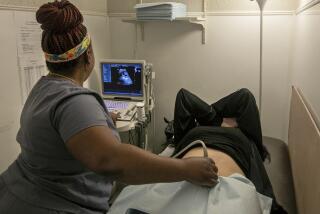States Vary on Infant Screening
- Share via
Most infants born in the U.S. are not being screened at birth for the full slate of 29 serious genetic disorders that are treatable if caught early, according to a report released today by the March of Dimes.
The report found 23 states screening for 20 or more of the conditions, 12 states that tested for 10 to 20, and 15 states plus the District of Columbia that screened for fewer than 10. One state, Mississippi, screened for all 29 conditions.
Only eight states screen for cystic fibrosis, one of the most common genetic disorders in the United States.
California currently screens for only a few genetic disorders: phenylketonuria, hypothyroidism, galactosemia and a family of blood disorders that includes sickle cell disease. Beginning Aug. 1, it will test for as many as 40 diseases.
An advisory panel recommended to the Department of Health and Human Services in March that the 29 tests be implemented nationwide.
Although there are many genetic disorders that could be screened for, the core 29 tests were selected by a panel of experts at the American College of Medical Genetics because there is a therapy for each one.
“All 29 of these conditions can be treated,” said Dr. Jennifer Howse, president of the March of Dimes. “But they’re quite devastating if they’re not detected at the newborn stage.”
About 63% of the 4 million babies born in the U.S. each year are offered 20 or fewer of the 29 tests, Howse said.
Newborn screening is performed on a blood sample taken from the baby’s heel. A hearing test may also be performed.
Dr. Stephen Edwards, a former president of the American Academy of Pediatrics and a member of the advisory panel, said the inconsistencies in practices among states could be tragic.
“It becomes very poignant when you know a state adjacent to you is doing things differently -- especially when you have one of those children who is not picked up,” he said. “You know that if your child was born just a few miles down the road, they would have been picked up.”
More to Read
Sign up for Essential California
The most important California stories and recommendations in your inbox every morning.
You may occasionally receive promotional content from the Los Angeles Times.













